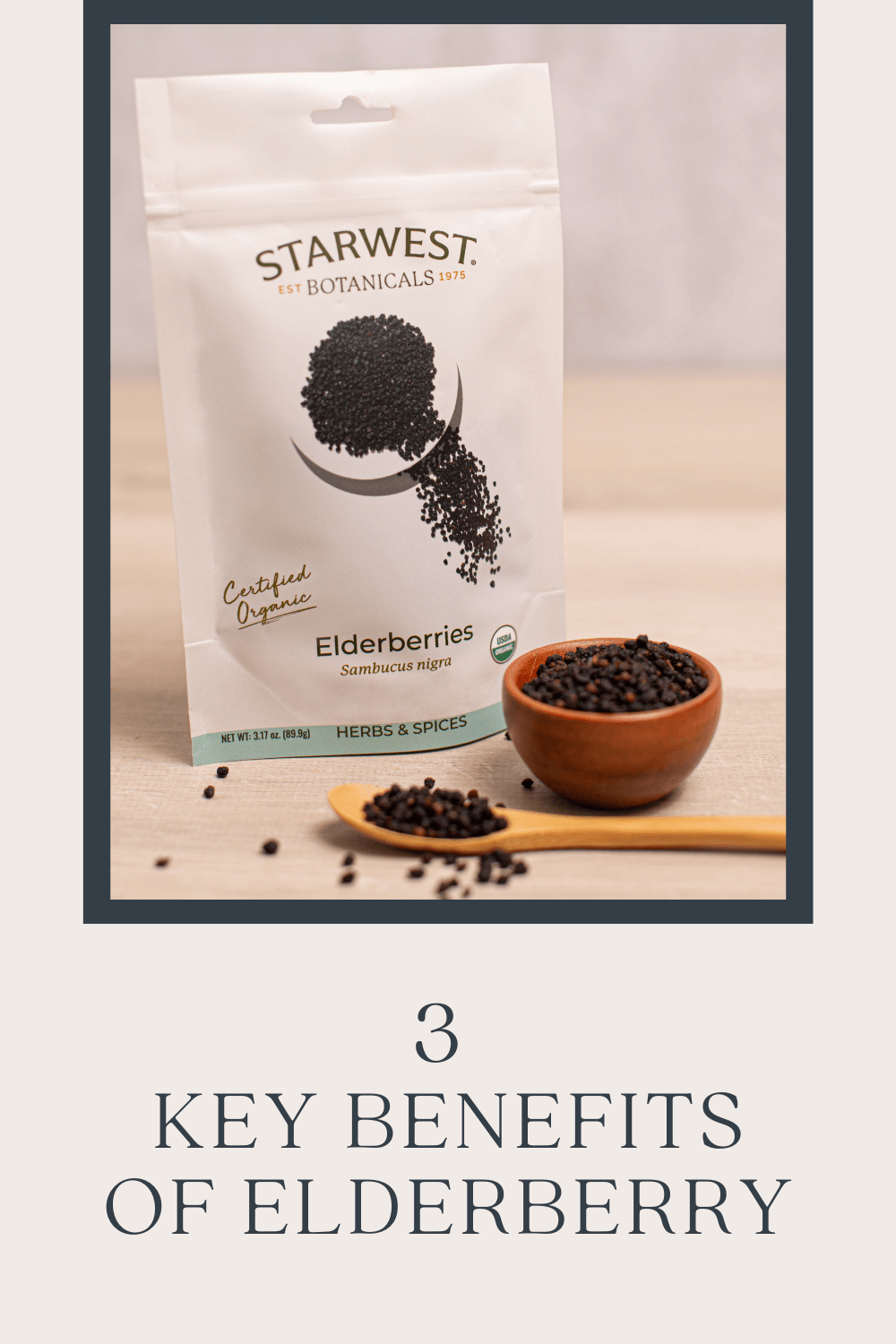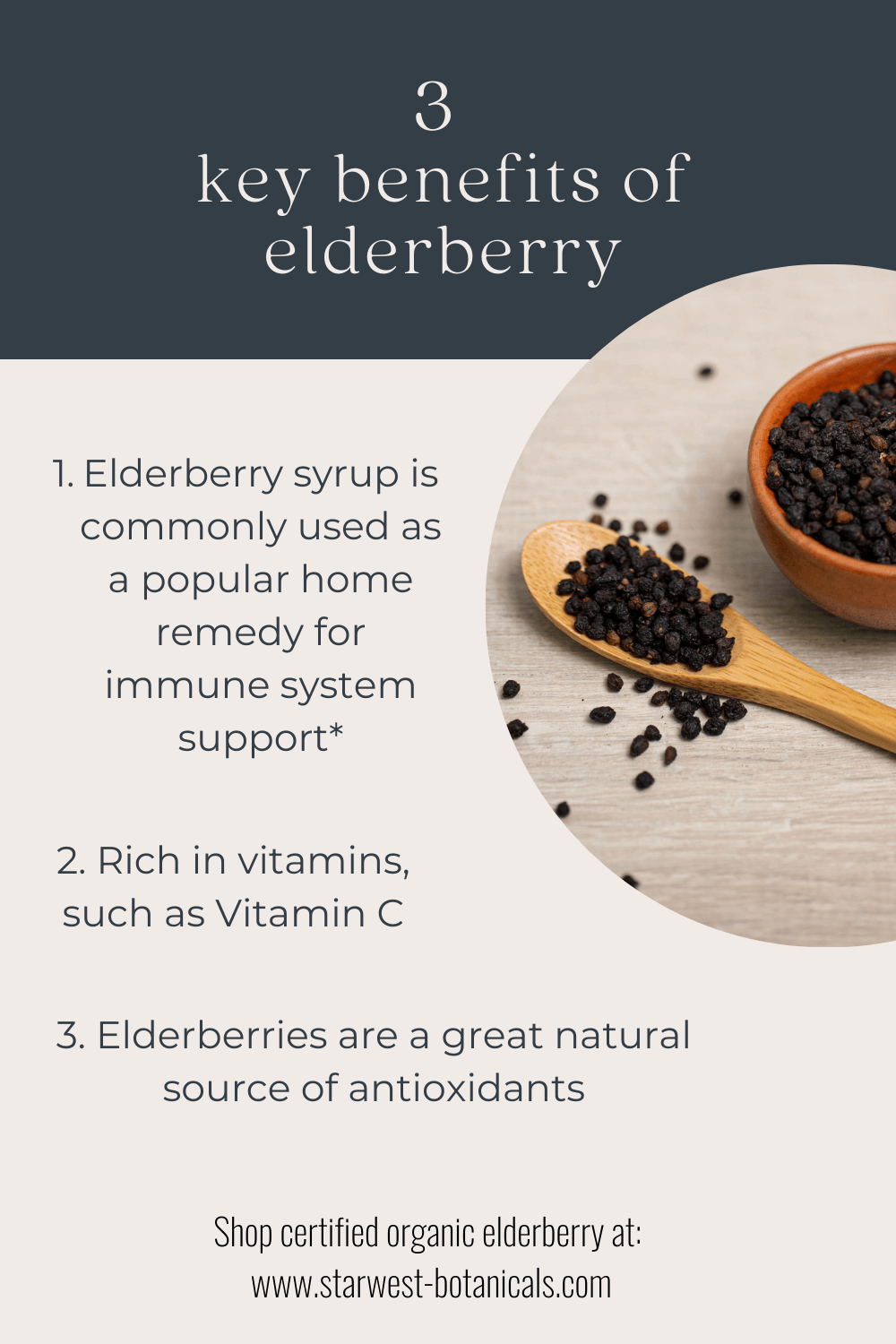3 Key Benefits of Elderberry | Starwest Botanicals
Posted by Daniel Powers on 03-15-2023

Elderberry is a popular herb that’s known for its various possible health benefits- especially for immune health.
In this article, we’ll review the top scientifically-backed health benefits of elderberry.
Whether you prefer to take elderberry syrup, tincture, or whole berries, learn more about elderberry below.
What is Elderberry?
Elderberry, also known as black elderberry or Sambucus nigra, is a berry that comes from the elder tree.
Elderberries are loaded with nutrients, in fact, elderberries are known to contain the following nutrients:
- Vitamins, including A, B1, B2, B6, B9, C, and E
- Trace elements, including copper, zinc, and iron
- and minerals such as potassium, calcium, and magnesium
Elderberries are also rich in various phytochemicals. Researchers have found that elderberries are one of the richest sources of anthocyanins.
While modern researchers have keyed in on the nutrients and phytochemicals present in elderberry, ancient humans have known about the health benefits of elderberries for thousands of years.
Elderberries have been used in folk medicine for millennia as a diaphoretic and diuretic agent. In European folklore, elderberry consumption was associated with increased longevity and vigor.
Below we’ll review the top research-backed health benefits of elderberries.

1. May Help Support The Immune System
Elderberry is known as a popular herb for immunity support, and for good reason. Research shows that Elderberry may be a beneficial herb for the immune system.
In particular, Elderberry syrup has been used as a popular home remedy for immune system support. A research review looked at the impact of elderberry on the immune system, it appeared to support overall health and wellness.
Another study found that elderberry may help to support the immune system.
2. Nutrient Rich
Elderberries are a low-calorie food that are filled with antioxidants. A win-win combination.
Elderberries are loaded with nutrients, including:
- Rich in vitamin C. It’s estimated that 1 cup of elderberries accounts for over 50% of your daily vitamin C needs. Vitamin C is key for a strong immune system.
- Dietary fiber. Elderberries have around 10 grams of fiber per cup of berries, this provides over 1/3rd of your daily fiber needs*. (*Raw elderberries should not be consumed.)
- A good source of flavonols. Elderberry contains the antioxidant flavonols quercetin, kaempferol, and isorhamnetin. It should be noted that elderflowers contain up to 10 times more flavonols than elderberries.
- Rich in anthocyanins. These phytochemical compounds give elderberries their deep purple color and may provide the body with natural antioxidants
As you can see, elderberries provide a nice combination of both nutrients (i.e. vitamins) and phytochemicals which may work together to help support your body.
It should be noted that the number of nutrients and phytochemicals present in elderberries can vary depending on a variety of different factors, including the type of elderberry, the time of season that the berries are picked, and growing season conditions.
Make sure to buy organic or wildcrafted elderberries for the best results.
3. Antioxidant Rich
Elderberries are a great natural source of antioxidants. Antioxidants are natural molecules that help to protect the body from free radical damage.
Eating foods rich in antioxidants is thought to be helpful for slowing down the aging process and promoting overall health and well-being.
Multiple studies have discovered that elderberries have strong antioxidant activity within the body.
The antioxidant properties of elderberry are primarily attributable to the presence of phenolic compounds within the plant.
Interestingly, one study found that elder flowers have a stronger antioxidant profile than elderberries.
If you’re looking to support your body and fight free radical damage, consider adding elderberries (or elderflowers) to your daily routine.
How To Add Elderberry To Your Diet:
Based on the health benefits listed above, adding elderberries to your diet is an easy decision - especially if you're looking to support your immune health.
So what's the best way to add elderberry to your diet?
The best way to incorporate elderberries into your diet is by taking elderberry syrup. It tastes great and may help to support a healthy immune system.
While you can buy elderberry syrup, the ideal way to get the freshest possible elderberry syrup is to make your own.
At Starwest Botanicals, we have a variety of different types of elderberries available for sale, including:
Typically elderberries are boiled with water to create a rough extract, honey is then added to make elderberry syrup. We recommend adding Rose Hips too for an extra boost of vitamin C.
Or, we offer an Organic Elderberry Extract, which allows you to get the benefits of elderberries with one dropperful a day. Plus, there’s no added sugar.
We also sell organic elderflowers, which makes a great tea.
However you decide to take elderberry, the key is to make sure that you take this herb consistently, especially during the winter months.
Conclusion:
Elderberry is a well-known herb with a wide variety of benefits.
Research shows that elderberries may provide many different health benefits, especially for immune health.
As an added bonus, elderberries are also rich in nutrients, phytochemicals, and antioxidants.
If you are looking for natural support in any of these areas, elderberry is worth considering.
Here at Starwest, we offer a variety of elderberry products. Whether you’re looking for whole berries, elderflowers, or a done-for-you elderberry extract, we have you covered with certified organic elderberry in bulk.
Have you tried elderberries before? What's your favorite way to add this beneficial herb in your diet?
Author Bio:
Daniel has a master's degree in herbal science from the Maryland University of Integrative Health. He's the founder of The Botanical Institute, where he writes about the health benefits of herbs.


